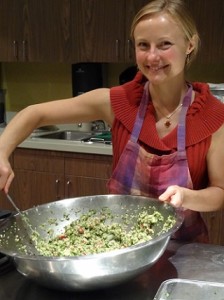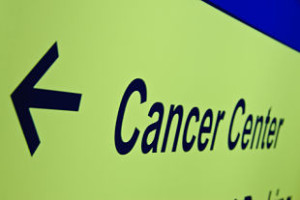
The highlight of the UCSD
Integrative Oncology Conference for me was listening and speaking to Dr. T Colin Campbell, author of the masterpiece The China Study
The UCSD Center for Integrative Medicine Treats and Prevents Cancer By Helping Your Body to Heal Itself
You may think of cancer as a discrete mass of cells with a life of its own. Every kind of cancer is labeled with the part of the body it first targeted. Yet your whole body is key to preventing and healing cancer, regardless of the type. To a great extent, all cancers begin in your mind, when you tell yourself to eat risky foods and spend the evening stressing out while sitting on the sofa. With the right knowledge and motivation, you can just as easily make healing lifestyle choices.
The University of California San Diego (UCSD) Center for Integrative Medicine weaves together open-minded conventional medicine with evidence-based approaches that go beyond drugs and surgery. I was privileged to attend the Center’s April 2013 Conference on Integrative Oncology, which brought together a range of perspectives on taming cancer using a whole body approach to strengthen self-healing.
The China Study‘s brilliant author, T Colin Campbell, PhD, was a keynote speaker. Dr. Campbell reviewed the highlights of research over decades that develops compelling evidence for the relationship between diet and cancer. Nutrition controls genetic expression to a huge extent. This is

The standard American diet, laden with animal foods, is a time bomb on your plate, as Dr. Campbell’s decades of research have demonstrated
especially true for the action of animal protein. Dr. Campbell found that casein, the main protein in dairy foods, had the effect of turning tumor growth on and off as the amount of casein in the diet was manipulated up and down. Plant proteins, even in similarly high concentrations, did not -in contrast – incite cancer progression.
The more Dr. Campbell researched the process by which casein made tumors grow, the more ways he found. He discovered a “tsunami of mechanisms” by which animal protein underlies cancer progression, and stated “casein is the most relevant carcinogen ever identified.”
Dr. Campbell concluded with a description of the powerful effects of a whole foods, plant-based diet. This ideal nutrition prevents and cures most chronic disease, and does it quickly, in days to weeks. All this with no harmful side effects. So nutrition therapy trumps drug therapy. Whole foods optimize the functioning of your whole body.
Two of the other Conference speakers pointed out the role of stress and other mental factors in making the body vulnerable to genetic damage, while effective mind/body healing mechanisms are protective. Dr. Scott Lippman, Director of the UCSD Moores Cancer Center, discussed the finding that early palliative care prolongs lung cancer survival. Palliative care is not direct treatment of cancer, but instead involves health care professionals meeting with the patient to assess symptoms, establish goals, assist in making decisions, and coordinating care based on each patient’s specific needs.
You are likely not surprised that patients who received palliative care had higher quality of life and better mood. What does indicate the interaction of mind and body is the fact that patients receiving early palliative care had less aggressive medical care for their cancer at the end of life, but survived significantly longer.
Dr. Sheila Patel, Medical Director of the Chopra Center for Wellbeing, reinforced the research supporting the role of stress and mind/body healing for cancer patients. She pointed out that stress directly impacts immunity and inflammation, and chronic inflammation underlies cancer through multiple mechanisms. She recommends relaxation to give yourself a break from the overstimulation of modern life.
Several survivors related their gripping stories of medically documented recovery from stage 4 cancer. I

Lauray MacElhern, Managing Director of the Center for Integrative Medicine, shows students in the Natural Healing and Cooking Program how to make easy, delicious, healthy meals
was especially fascinated by the recovery and triumph of Bhava Ram, an NBS News war correspondent who traveled the world in perilous situations, but was ultimately felled by a broken back, failed surgery, and stage 4 cancer. An organic vegan diet became his “organic chemotherapy.” Intensive yoga practice was the other essential aspect of his journey to radiant health, leaving both cancer and back pain in a past that only inspires him now to teach and help others.
The Center for Integrative Medicine reaches out to the San Diego community with cancer-fighting plant-based cooking classes. Dr. Gordon Saxe, the Center’s Research Director, and Lauray MacElhern, the Center’s Managing Director, run the classes at Casa de Luz, a unique dining room with delicious, organic, plant-based meals. During the Conference, both spoke about the power of food in concert with mind/body modalities to reduce stress and facilitate the body’s healing power. Dr. Saxe told the moving story of his own father’s battle with cancer.
By emphasizing cancer is a whole body disease, not an isolated tumor that is best treated only by surgery and highly toxic drugs and radiation, the Center for Integrative Medicine and the Conference speakers show the way to a truly effective, integrative oncology with plant-based nutrition at its core.
Intrigued? Now you can use our Whole Foods Blog Finder to target informative, fun postings on whole foods, plant-based diets. Quick information at no cost!
Blog posting by Janice Stanger, Ph.D. Janice authored The Perfect Formula Diet: How to Lose Weight and Get Healthy Now With Six Kinds of Whole Foods. The book describes a plant-based diet plan that can prevent, and even reverse, most chronic disease – and that includes cancer in many cases. Janice is thrilled to hear Dr. Campbell present, and speak with him after.
Tags: antioxidants, Bhava Ram, cancer, Dr. Gordon Saxe, Dr. Sheila Patel, Dr. T. Colin Campbell, getting healthy, intgrative oncology, Lauray MacElhern, nutrition and cancer, Plant-based nutrition, recovery from stage 4 cancer, The China Study, UCSD Center for Integrative Medicine, whole foods plant-based diet, yoga






